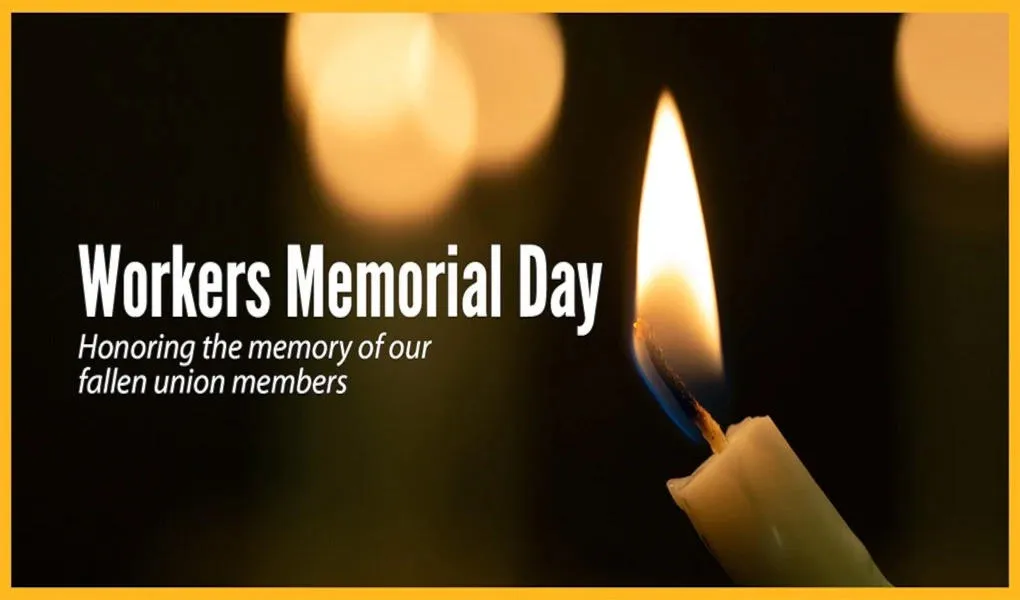Organized labor observes April 28 as Workers Memorial Day because “each day, more than 340 workers are killed and more than 6,000 suffer injury and illness because of dangerous working conditions that are preventable,” the AFL-CIO explains.
The voice of history, the subject I taught in a community college for two dozen years, could hardly be louder or clearer when it comes to unions and to worker safety and health laws.
We need them both.
“Our workplace safety and health rights are not freely given,” says the AFL-CIO. “Working people have fought for them for decades and still do every day – from the shop floor to the halls of Congress. Anti-regulatory attacks have put our working conditions in danger – threats that would remove protections we take for granted. Congressional Republicans are attempting to defund the Occupational Safety and Health Administration (OSHA), remove funding for mine safety law enforcement, and prevent future worker safety and health regulations from being developed.”
In an ideal world, everybody would live by the Golden Rule, some form of which can be found in just about every religion. But we live in a real world where, sadly, greed is the gospel of many employers. If they had their way, we wouldn’t have unions or worker safety and health laws. For a long time, we didn’t have either. Not until the 1930s did a Democratic-majority New Deal Congress pass legislation giving workers the right to bargain collectively and requiring their employers to recognize unions.
President Franklin D. Roosevelt, a Democrat, signed the legislation into law.
Not until 1970 did Congress create the Occupational Safety and Health Administration. The landmark bill passed with bipartisan support. Even Republican President Richard Nixon, who was less than labor-friendly, hailed the bill.
OSHA was needed because many, if not most, state and local worker safety and health laws were inadequate or were not rigorously enforced. Before strong unions and meaningful protections for worker safety and health, most workers toiled long hours at low pay in jobs that threatened — and often claimed — life and limb.
This month marked the 107th anniversary of America’s entry into World War I, the bloodiest conflict in history to that point.
The war — called the Great War before World War II took place — started in 1914, the same year that some 35,000 U.S. workers were killed in industrial accidents, according to historian Howard Zinn. That death toll equals two-thirds of all U.S. battle deaths in the global conflict, which ended in November, 1918.
A century ago, railroads, mines, mills, and factories were slaughterhouses. Many children were among the dead. Child labor was widespread in American industry. Adults were so poorly paid that boys and girls as young as 10 had to go to work to help their parents try to make ends meet.
Anyway, while employers and their puppet politicians are still fighting organized labor and government safety and health regulations, the right-wing media echo chamber and groups like the U.S. Chamber of Commerce and its state and local affiliates are still propagandizing for “free enterprise,” meaning union free and regulation free.
History teaches that employers, helped by their bought-and-paid for politicians and a sympathetic conservative media, ensured that a strong union movement and something like OSHA would be a long time coming. But come they both did.
Since 1989, unions have been observing April 28 as Workers Memorial Day because OSHA began operating on April 28, 1971. OSHA did much to improve worker safety and health for all workers, not just union members.
When we pause this Workers Memorial Day to remember those who lost their lives, or became ill or injured, on the job because their employers elevated profit over worker safety and health, let us remember the words of one of the greatest union heroes from history, Mary Harris “Mother” Jones:
“Mourn the dead; fight like hell for the living!”
--30--








